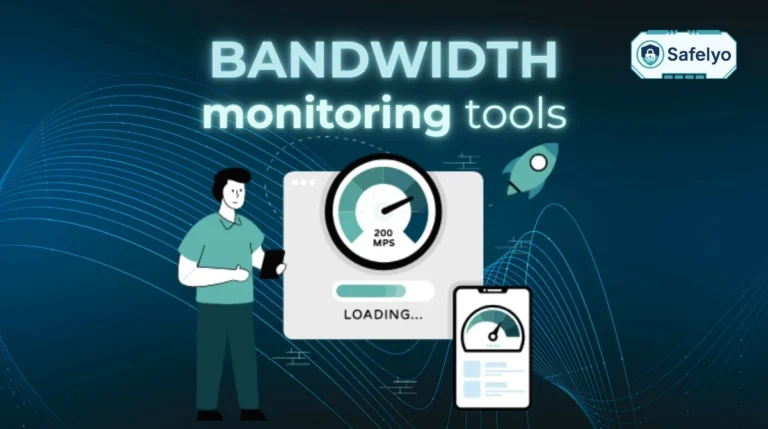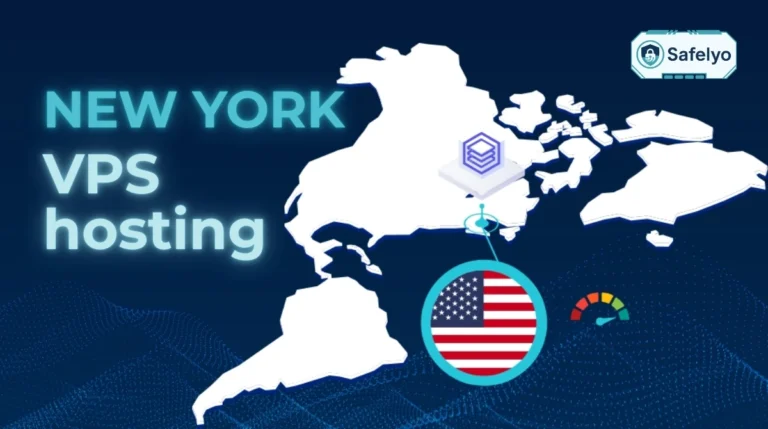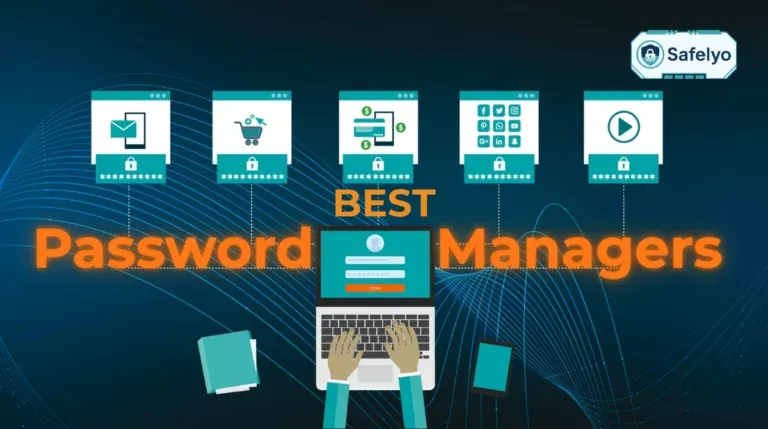Think of your email inbox as your digital filing cabinet – a place for your most private conversations, documents, and records. But with mainstream services like Gmail, the “postman” is systematically reading every letter for advertising data before it even reaches you.
In an era where personal data is constantly being monetized, securing your inbox isn’t a niche concern – it’s an essential act of digital self-defense. Switching to one of the best free secure email providers is the single most important step you can take to reclaim that fundamental right to privacy.
As a privacy advocate, I’ve tested many of these services. I’ve seen the difference between a “free” service that sells your data and one designed to protect it. This isn’t just about avoiding ads; it’s about ensuring your private communications remain truly private.
In this comprehensive guide, you’ll discover:
- Why mainstream email is like a postcard, and secure email is a sealed letter.
- The 5 non-negotiable features every truly private email service must have.
- Our hands-on test results of the top free plans from providers like Proton Mail and Tuta.
- How to choose the right provider for your specific privacy needs.
Don’t let your personal correspondence be a product. Let me guide you through the simple steps to lock down your inbox and take back your privacy.
The bottom line: What's the best free secure email?
From my experience, Proton Mail offers the best all-around free plan. It’s generous with storage and has a modern, intuitive feel that makes the switch from Gmail seamless. For anyone new to private email, this is my top recommendation.
Tuta (formerly Tutanota) is an excellent choice if your top priority is absolute encryption. It’s one of the few services that encrypts your subject lines by default, which is a significant privacy advantage.
Honestly, choosing either is a massive privacy upgrade over having your data scanned by Gmail or Outlook. This guide will break down the real-world experience of using each, so you can choose the one that’s right for you.
1. The best free secure email providers of 2025
After extensive testing and verifying each service against our security checklist, three providers consistently stand out. While dozens of “secure” email services exist, these are the ones that offer the best, most usable free plans without compromising on core privacy features.
Here’s how our top 3 stack up at a glance:
| Rank – Email Provider | Best For | Key Free Plan Feature |
| #1 – Proton Mail | Overall Features & Ecosystem | 1 GB storage and a modern, polished user experience. |
| #2 – Tuta (Tutanota) | Simplicity & Total Encryption | Encrypts subject lines and calendar events by default. |
| #3 – Mailfence | Advanced Features (Non-E2EE) | Integrated calendar and document storage features. |
While Proton Mail and Tuta are my top recommendations for true end-to-end encrypted email and communication, Mailfence is a worthy mention for those looking for a private alternative to the Google suite, even if its encryption model is slightly different.
Now, let’s dive into the hands-on experience of using each of these free plans.
2. In-depth reviews: A hands-on look at the free plans
Knowing the theory is one thing, but how do these free services feel in the real world? To find out, I signed up for a free account with each of our top contenders. I used them for a week – sending emails, organizing my inbox, and testing their unique features on both my laptop and phone.
Here’s my detailed, hands-on breakdown of what you can really expect.
2.1. #1 – Proton Mail
Proton Mail offers the most generous and feature-rich free plan on the market, backed by a world-class reputation for security and the legal protection of its base in Switzerland. For most people leaving Gmail, it’s the smoothest and most capable transition into the world of private email.

Free plan showdown
When I signed up for the free account, this is exactly what was on offer:
- Storage: 1 GB (which can be expanded up to 5 GB through promotional actions).
- Email Limit: A cap of 150 messages per day.
- Labels/Folders: Up to 3 custom folders or labels.
The signup process was a breeze and, true to their promise, it didn’t require any personal information. I was able to create my account anonymously. The first thing I noticed was how polished the interface is. Both the web app and the mobile app are modern, fast, and intuitive – if you’ve used Gmail, you’ll feel right at home within minutes. There was no steep learning curve, which is a huge plus.
Feature spotlight - Sending an encrypted email to a Gmail user
This is the feature I was most curious about. How do you send a “sealed letter” to someone using a “postcard” service? I found the process surprisingly simple.
- I composed a new email as usual.
- Before sending, I clicked the lock icon and set a password for the email.
- The recipient (using my test Gmail account) didn’t receive the email content. Instead, they got a notification with a link to a secure webpage hosted by Proton.
- On that page, they entered the password I had shared with them separately, and the message was instantly decrypted for them to read. It’s a seamless and highly secure process that works perfectly.
Beyond email: The Proton Ecosystem
One of the best things about choosing Proton Mail is that you’re not just getting an email account; you’re getting a key to an entire suite of privacy-focused tools. Your free Proton account also gives you access to Proton VPN (a limited free version), Proton Calendar, and Proton Drive (cloud storage). This creates a powerful, integrated alternative to the Google ecosystem.
PROS
- Most generous free storage (1 GB)
- Modern, user-friendly interface
- Based in privacy-haven Switzerland
- Part of a larger privacy ecosystem
CONS
- The 150 emails/day limit can be restrictive for power users
- Only 3 custom folders/labels
- No custom domain support on the free tier
Proton Mail – Best overall free secure email
For the user who wants the best all-around free secure email without major compromises, Proton Mail is the clear winner. It strikes the perfect balance between powerful, user-friendly features and uncompromising, proven security.
2.2. #2 – Tuta (Tutanota)
Tuta (formerly Tutanota) is a close and formidable competitor to Proton Mail, built with a laser focus on one thing: Maximizing encryption. Based in privacy-friendly Germany, it’s the ideal choice for users who want the simplest interface and the most comprehensive encryption possible, right out of the box.
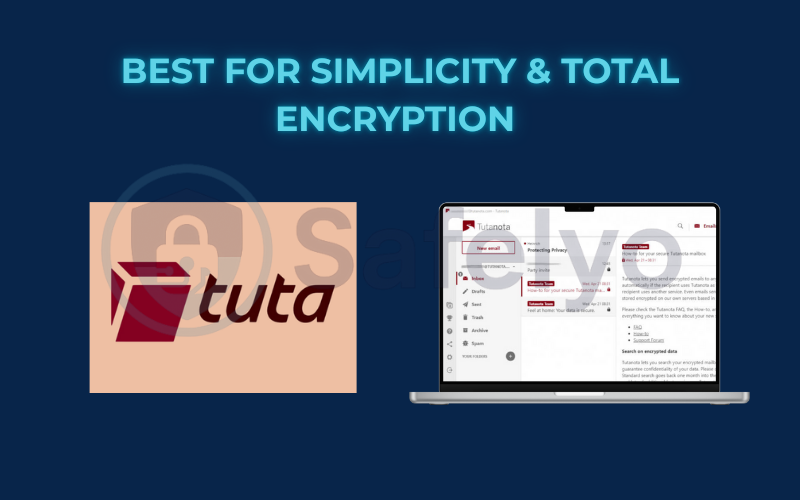
Free plan showdown
Here’s what I got when I signed up for Tuta’s free plan:
- Storage: 1 GB.
- Email Limit: No hard daily limit is published, but it’s monitored for “fair use.”
- Extra Features: A fully end-to-end encrypted calendar is included for free.
Our onboarding experience
The signup process was just as anonymous as Proton’s. The interface is noticeably more minimalist, which I found to be a refreshing change. It’s clean, extremely fast, and completely free of clutter. There are fewer features on the screen, which makes it feel less intimidating for someone who just wants a straightforward, secure inbox. The mobile app is equally fast and efficient.
Feature spotlight - Encrypting everything by default
Tuta’s biggest differentiator is its encryption philosophy. While most secure providers encrypt the body of your email, Tuta also encrypts the subject line by default. This is a significant privacy win. Think about it: a subject line like “Appointment with Dr. Smith regarding test results” can reveal a lot of sensitive information on its own. With Tuta, even that metadata is unreadable to the company.
I also tested the free encrypted calendar. Creating an event felt similar to using Google Calendar. However, I had the peace of mind knowing that all my appointment details were fully encrypted and private. For me, this is a killer feature for a free plan.
PROS
- Encrypts subject lines for maximum privacy
- Free end-to-end encrypted calendar included
- Based in privacy-strong Germany
- Very fast and lightweight interface
CONS
- The interface is very minimal, and it might lack features for power users
- Less brand recognition than Proton Mail
- The ecosystem of other products is less developed
Tuta (Tutanota) – Best for simplicity & total encryption
If your primary goal is the strongest possible encryption in the simplest package, Tuta is an outstanding choice. The encryption of subject lines and the inclusion of a free encrypted calendar make its free offering incredibly compelling, especially for users who value a clean, no-frills privacy experience.
2.3. #3 – Mailfence
Mailfence is a bit different from Proton and Tuta, but it earns its spot on our list for being a powerful, private alternative to the Google suite. Based in Belgium, it offers a robust set of productivity tools, even if its default encryption model isn’t end-to-end.
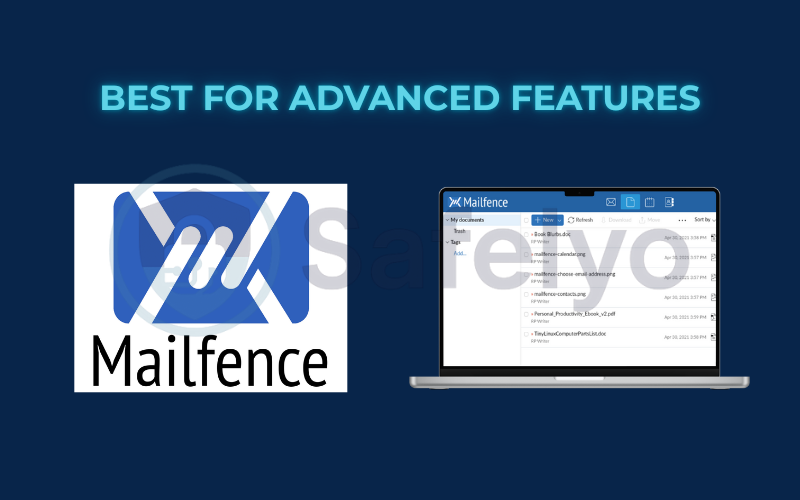
Free plan showdown
The Mailfence free plan offers:
- Storage: 500 MB for emails and 500 MB for documents.
- Email Limit: No hard limit, subject to fair use.
- Extra Features: Includes a full calendar, document storage, and contact management.
Our onboarding experience
Signing up for Mailfence felt more like creating an account for a full office suite. The interface immediately presents you with a dashboard that integrates your email, calendar, and documents. It’s clearly aimed at users who want to replace not just Gmail, but Google Calendar and Google Docs as well. While it feels a bit more “corporate” than Proton or Tuta, the tools are powerful and well-integrated.
Feature spotlight - A note on encryption
This is a critical distinction. Mailfence uses server-side encryption, meaning your emails are encrypted on their servers. This protects your data from outside attackers, but, unlike Proton and Tuta, it doesn’t use a zero-knowledge model by default. This means Mailfence could theoretically be compelled to access your data.
However, it fully supports OpenPGP, a powerful standard for true end-to-end encryption. You can enable this feature and send fully E2EE messages to other PGP users, but it requires more setup and isn’t the default for every email. I see Mailfence as a “privacy-conscious” provider rather than a “zero-knowledge” provider by default.
PROS
- Full productivity suite (calendar, docs) included
- Powerful contact and group management tools
- Based in privacy-friendly Belgium
CONS
- Not zero-knowledge by default (a major difference)
- 500 MB email storage is less than that of competitors
- End-to-end encryption requires manual setup (OpenPGP)
- Interface feels a bit dated
Mailfence – Best for advanced features (Non-E2EE)
Mailfence’s free plan is less suited for the pure security enthusiast but is a great option for someone looking for a private, full-featured alternative to the Google suite. If you need integrated calendar and document tools and are comfortable with server-side encryption for most of your emails, it offers a lot of value.
3. Why your free email isn’t private
Before we look at the top providers, we need to understand a fundamental difference. For years, I’ve used a simple analogy to explain email privacy to friends and family, and it changes the way they see their inbox forever.
GMAIL & OUTLOOK: SENDING A POSTCARD
Using a mainstream email service like Gmail or Outlook is like sending a postcard. It’s fast, convenient, and gets the job done. But imagine if the postal service (Google/Microsoft) made a copy of every postcard you sent and received. They read the entire message to understand your interests, track your purchases, and see who you talk to.
They don’t do this to be malicious; they do it because you are the product. They scan this information to build a detailed profile on you, which they use to show you hyper-targeted ads and train their artificial intelligence systems. The convenience of their “free” service is paid for with the currency of your private data.
SECURE EMAIL: SENDING A SEALED LETTER
Now, imagine writing a private letter, putting it in a thick security envelope, and sealing it with a unique wax seal. This is what using the best free secure email provider is like.
This “seal” is called end-to-end encryption (E2EE). When you send an email, it’s locked on your device and can only be unlocked by the recipient who has the matching key.
Not even the postal service (the email provider like Proton Mail or Tuta) can see what’s inside. They can see the envelope’s addressing information (metadata, like who it’s from and to), but the message content itself is completely unreadable to them.
This is all made possible by a principle called zero-knowledge encryption. It’s a simple but powerful guarantee: the provider has “zero knowledge” of your password or the contents of your emails. They literally cannot access your data, even if compelled by a court order. This is the ultimate privacy protection and the core difference between a postcard and a truly sealed letter.
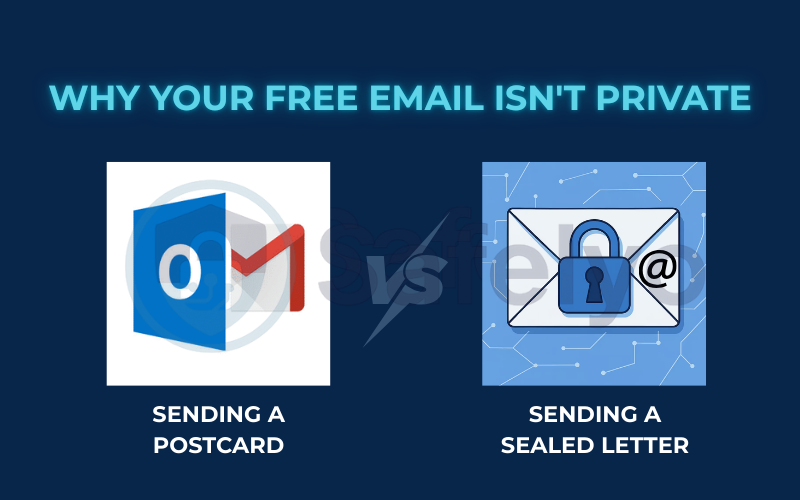
4. Safelyo’s secure email checklist: 5 must-have features
Now that you understand the “sealed letter” principle, how do you spot a truly secure email provider? Over the years, I’ve developed a checklist of non-negotiable features. If a service can’t tick all five of these boxes, I simply won’t trust it with my private communications.
Use this table as your guide when evaluating any email service:
| Feature | The Safelyo Standard | Why It Matters |
| End-to-End Encryption | Must have | This is the “seal” on your letter. It ensures only you and your recipient can read your message content. |
| Zero-Knowledge Architecture | Must have | This makes it technically impossible for the email company to access your inbox, even if they wanted to. |
| Privacy-First Jurisdiction | Must have | The company must be based in a country with strong privacy laws (like Switzerland or Germany) to protect you from data requests. |
| Open-Source Code | Must have | This allows independent experts to verify the security of the apps, ensuring there are no hidden backdoors. |
| Anonymous Sign-up | Must have | You shouldn’t have to provide personal info like a phone number to create a private account. |
Any service that meets all these criteria provides a powerful foundation for your digital privacy.
5. Free secure email: What are the trade-offs?
I’m a huge advocate for these free, private email services – they represent a massive step up from mainstream providers. However, it’s important to be realistic. These companies need a way to fund their operations, and that means their free plans will always have certain limitations designed to encourage you to upgrade to a paid plan.
Based on my experience using these services, here are the four main trade-offs you’ll typically encounter:
1. Limited Storage Space
While Proton Mail’s 1 GB is generous for a secure provider, it’s a fraction of the 15 GB you get for free with a Gmail account. This means you’ll need to be more mindful of your inbox. You can’t let thousands of promotional emails and large attachments pile up. I found myself having to regularly clear out old, unimportant messages to stay under the limit, which is a habit I’d lost after years on Gmail.
2. Strict Sending Limits
A cap of 150 emails per day is more than enough for my personal communication needs. However, if you’re a power user, run a small newsletter, or use your email for business outreach, you will hit this limit very quickly. These free plans are designed for personal, one-to-one conversations, not for mass mailing.
3. No Custom Domains
This is a big one for professionals. On a free plan, you can’t use your own domain name (e.g., you@yourname.com). You have to use the provider’s domain (e.g., yourname@proton.me or yourname@tuta.com). While this is perfectly fine for a personal account, it lacks the professional branding that a custom domain provides.
4. Fewer Advanced Features
Things that power users often take for granted are typically reserved for paid subscribers. This includes features like unlimited folders/labels, advanced search filters, and the ability to create multiple email aliases (e.g., shopping@proton.me, newsletters@proton.me) to better organise your inbox and protect your main address.
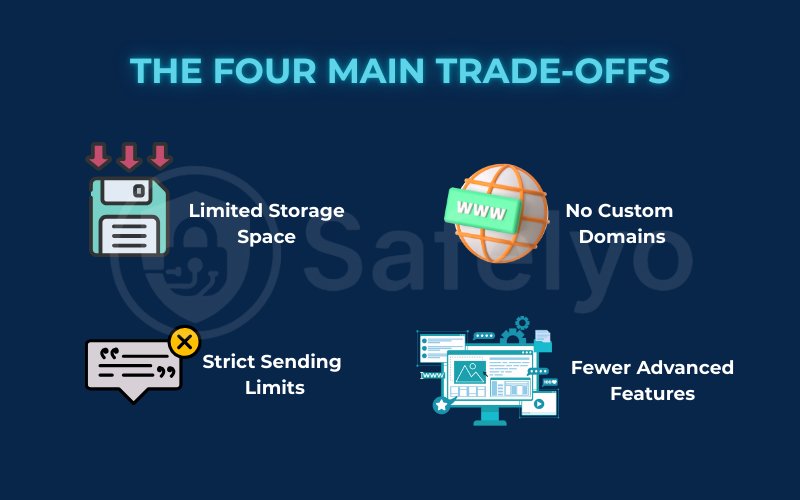
The Bottom Line
A free, secure email account is the perfect starting point for enhancing your personal privacy. Think of it as your highly secure inbox for your most important conversations. As your needs grow, or if you require more professional features, upgrading to a paid plan is a small price to pay for reclaiming full control over your digital communications.
6. FAQ about the best free secure email
Switching to a secure email can feel like a big step, so it’s natural to have questions. Here are my direct answers to the most common queries we receive about making the move to a private inbox.
Which email is safer than Gmail?
Practically any email service that offers end-to-end encryption and a zero-knowledge architecture is significantly safer than Gmail. Our top recommendations, Proton Mail and Tuta, are based on the principle that only you should be able to read your emails. This level of security is not offered by Gmail.
Which free email is most secure?
Both Proton Mail and Tuta offer exceptional security in their free plans. Proton Mail is the best all-around choice for features and usability, while Tuta is arguably more secure in one key aspect: it encrypts your email subject lines by default, offering more comprehensive privacy.
What is the most unhackable email?
No online service is 100% “unhackable.” However, with a zero-knowledge provider like Proton Mail or Tuta, even if the company’s servers were breached, your encrypted emails would remain unreadable to the hackers. Your security is mathematically protected by encryption, not just by the company’s firewalls.
Is Proton Mail or Tuta better?
It depends on your priority. Proton Mail is better if you want a more feature-rich experience and access to a broader privacy ecosystem (VPN, Calendar, Drive). Tuta is better if your absolute priority is maximum encryption in the simplest possible package.
What if I forget my password for a zero-knowledge email account?
This is the most important thing to understand. Because the provider has zero knowledge of your password, they cannot reset it for you. If you lose both your password and your recovery key, your account and all its data will be permanently and irretrievably lost.
Can I move my old emails from Gmail to Proton Mail?
Yes, most secure providers, including Proton Mail, offer an “Easy Switch” or import tool. However, this feature is typically only available on their paid plans as an incentive to upgrade.
Is a secure email account truly anonymous?
It is highly private, but not automatically anonymous. For true anonymity, you would need to take extra steps, such as signing up for the service over the Tor network and never linking any personal information to the account.
Safelyo’s expert warning: With great power comes great responsibility.
The ‘zero-knowledge’ architecture of secure email is its greatest strength, but also its biggest risk for new users. Because the provider cannot access your account, they cannot reset your password for you. When you sign up, you will be given a recovery phrase or file. Treat this like the key to a physical safe. Print it out, store it somewhere secure and offline. Losing it means losing access to your inbox forever.
7. Conclusion
Switching from a ‘postcard’ to a ‘sealed letter’ is a significant privacy upgrade. The best free secure email providers have made this transition easier and more accessible than ever. You no longer have to trade your personal data for a free inbox.
Here are the key takeaways to remember:
- Secure email uses end-to-end encryption, making your messages unreadable to the provider.
- Proton Mail offers the best all-around free plan, with generous storage and a polished user experience.
- Tuta is a fantastic alternative with a strong focus on total encryption, including subject lines.
- Be aware of the limitations of free plans and never, ever lose your recovery phrase.
Your private conversations deserve real privacy. Take five minutes today to open a free secure email account and start taking back control of your data. An encrypted email is a great foundation. And to secure the rest of your digital life, explore the other Digital Tools & App Review articles on the Best VPN Services and password managers from Safelyo.

